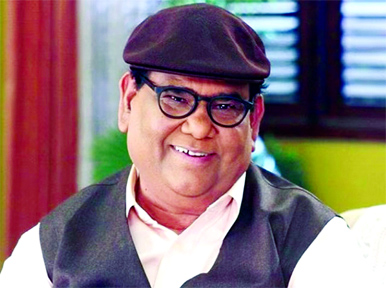His qualities as an actor and successes as a director, exceptional as they were, could not eclipse Satish Kaushik’s greatest gift – his self-effacing geniality. A man and a professional of singular mettle, he radiated infectious joie de vivre on the screen and off it. Kaushik, who passed away on the night of March 8 in Gurugram, made the journey from Delhi’s Karol Bagh to the Mumbai movie industry (via a couple of institutional pit stops that shaped him) without ever losing his solid moorings. He kept learning and evolving. Kaushik could have rested on his oars, having enjoyed consistent success both in front of and behind the movie camera since the mid-1980s. He did not. He kept his creative options open, especially in the second half of his Bollywood career.
About a decade into his stint as a film director, Kaushik told this writer: “I have been working non-stop since I made Hum Aapke Dil Mein Rehte Hain in 1999. I’ve had one release every year since then. I now want to take some time off… I am looking for creative renewal.”
In pursuit of that goal, he lent his support to, among others, Nagesh Kukunoor’s Lakshmi, a brutally graphic human trafficking drama, and N Padmakumar’s A Billion Colour Story, a film that looked for hope in an atmosphere of despair. Not only did Kaushik play cameos in the two films, he also co-produced them.
He nurtured his own dream of directing his first global film. Initially titled Lal Bihari Mritak, it was about an Uttar Pradesh villager deemed dead in the state’s revenue records and forced to fight tooth and nail to prove he was alive. Kaushik planned to fly in foreign technicians for the film.
This was around the time British filmmaker Sarah Gavron’s Brick Lane, adapted from Monica Ali’s novel of the same name, took Kaushik to international festivals. He could see that there was a whole world out there that he could attempt to break into.
It took Kaushik a decade and a half to bring the project to fruition. It took the form of the Zee5 original film Kaagaz, starring Pankaj Tripathi. If nothing else, the 2021 film, although a scaled-down version of what he had envisaged, was a testimony to the actor-director’s tenacity and his unwavering commitment to his craft.
Kaushik’s passion stemmed from his exposure as a young man to the works of the finest of playwrights (at the National School of Drama) and world cinema masters (at the Film and Television Institute of India). It was at the two premier institutes that the Kirori Mal College, Delhi graduate developed a deep reverence for quality theatre and cinema.
Even after he made a name for himself as an exceptionally talented comic actor and a director of a string of Mumbai blockbusters, including the Salman Khan-starrer Tere Naam, Kaushik itched to returned to the stage. He first did Mr and Mrs Murarilal, in which he played a former army cook who sang and danced his sorrows away, and then acted in Salesman Ramlal, a Hindi adaptation of Arthur Miller’s The Death of a Salesman.
Kaushik arrived in Mumbai in the late 1970s as a 22-year-old. He landed a small role in a Prithvi Theatre play, Bichhoo, which featured Naseeruddin Shah and Om Puri. After dabbling in odd jobs for a year and a bit, he co-wrote the dialogues of Kundan Shah’s Jaane Bhi Do Yaaron (1983).
As luck would have it, every 1983 film that Kaushik acted in – Jaane Bhi Do Yaaron, Woh 7 Din (which set Anil Kapoor on the path to stardom), Masoom (Shekhar Kapur’s directorial debut) and Shyam Benegal’s Mandi – is regarded as a Hindi cinema milestone.
Two years later, Shekhar Kapur cast him in Mr. India. The character, Calendar, imprinted himself on the minds of Hindi movie fans. Every year from there on, the actor had multiple releases. While comedy was his staple, the versatile performer did not limit himself to any single genre.
When director David Dhawan and actor Govinda were at their peak as a team in the 1990s, Kaushik was a fixture in virtually every rollicking comedy that the combo delivered. Among these were Saajan Chale Sasural, where Kaushik was tabla player Muthuswamy, and Deewana Mastana (1997), in which he played Pappu Pager so famously that Dhawan wrote another character with the same name in Hum Kisise Kum Nahin, made five years later. That the phenomenally effortless actor in Kaushik had many more productive years left in him was evidenced by his superlative performance in the recent SonyLIV web series, Scam 1992: The Harshad Mehta Story. Every scene that he was a part of and every line that he delivered proved, if proof was needed, that spontaneity was his forte.
The curtain has dropped way too early on a magnificent career, but the joy that Satish Kaushik the entertainer spread will live on.
Source: Business Standard
Satish Kaushik, master of spontaneous who radiated joie de vivre
